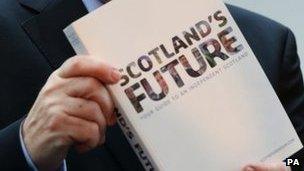'Will my season ticket still be valid?'
- Published

The paper answers 651 questions from members of the public
Well, it's not looking good for nuclear submariners or Scottish MPs. But apart from some job losses in those sectors, the message from today's independence white paper launch was one of reassurance.
The document includes a lot of questions:
Will I be able to get NHS treatment if I take ill while in England? "Yes..."
Can more be spent on affordable housing? "Yes..."
Will consumers in Scotland have access to a pensions ombudsman? "Yes..."
Will I still get my benefits on the same day of the week? "Yes..."
Will we need to re-apply for a Scottish driving licence? "No..."
Will my season ticket still be valid? "Yes..."
Will businesses still be able to brand their products as 'British made'? "Yes, Britain is a geographical term..."
Will independence affect who can play for the Scottish rugby and football teams? "No..."
Will an independent Scotland protect links to London airports? "With independence, the Scottish government will be able to protect routes." (Has anyone told Heathrow Airport about this?)
Would the Scottish Broadcasting Service participate in Comic Relief? "Yes..."
And, of course, what about the weather? "The Scottish government will seek agreement with Westminster on retaining Met Office services"
I could go on. And the White Paper does. There are 651 questions, the final one being: "How can I ask more questions?"
Safe change, or no change?
Reassurance runs through every answer. The promise is that nothing will get any worse, and lots of things could get better. Indeed, it claims lots of things will get better.
That certainty is what caused Alex Salmond and Nicola Sturgeon most trouble at their press conference, because the really tricksy issues are based on negotiations that will not start until after a "Yes" vote. And their assumptions are sunnily upbeat about the negotiating goodwill they'll meet from Whitehall and from 28 European member states.
On sharing the sterling currency, which took up the most time of any issue, they are telling Whitehall what its negotiating position ought to be.
Three groups seem to get particular attention, in what has been a long-standing approach by the Salmond leadership to identify weak spots and put in defences.

The world's media gathered for the launch of the White Paper
Women's support for independence is one concern. There are many policies which make the newsy bit of the White Paper look like an extensive manifesto for the 2016 Holyrood elections. But it's more childcare that gets top billing.
That issue is rising up the policy agenda at Westminster too, but for the SNP, it addresses a particular concern in the context of the referendum vote. It also happens to be one policy it could implement with devolved powers, if it chooses to treat childcare as a priority.
Pensioners get a lot of attention, and specially large doses of reassurance that independence won't harm their finances.
And then there's business. It doesn't vote, but its opinion matters. And much of business is sceptical.
It's given reassurance on the state of the public finances, on the level of interest rates in similar small countries, and some modest, carrot-shaped tax cuts.
We knew Alex Salmond wants to cut corporation tax to 3 percentage points below the UK rate. That's a policy with a moving target, because George Osborne has been cutting interest rates anyway.
The white paper wording is interesting. What's promised is a timetable to get "up to" 3 percentage points lower than the Westminster rate. So there's some caution alongside the reassurance.
And along with all the lashings of reassurance is that theme that's been running through the independence campaign for some time: vote "yes" in order to protect Scotland against other forms of public service and welfare change coming from Westminster. Vote for change in order to minimise change.
With a bit more time to digest the mighty tome that is 'Scotland's Future', some elements of the business strategy offer more insight than I'd seen previously.
One is about the labour market. The indications had been vague before, but it now seems clearer that the SNP leadership wants to head down the European route of tripartite government-unions-employer forums. That's a fundamental change to the way businesses and workplaces are run, and as the STUC has noted before, not everyone is ready for it.
It's proposing a National Convention on Employment and Labour Relations - a forum to look at labour market reform, skills shortages in key sectors and initiatives such as the Living Wage.
It extends to worker representation on company boards, citing the TUC finding that half of EU members give workers that right.
And it extends further to setting a target for women on company boards. If Norway can go for 40% female, why not Scotland? No, that's not the number chosen. But the SNP has a target in mind.
There's a Fair Work Commission as well (this white paper likes such devices to handle awkward questions - there's another on the pension age), where business, unions and others advise on the size of the minimum wage. It's not clear how that meshes with "full support" for the Living Wage campaign.
It could mean a rise in low-skilled wages. That's joined by a reversal of some of the workplace rights being rolled back at Westminster by the coalition government, including a return to the previous employment tribunal system.
All that may be laudable stuff for workplace fairness. But there are tensions and trade-offs there with another section of the white paper, which sets out the many ways in which the SNP would like to help businesses grow.